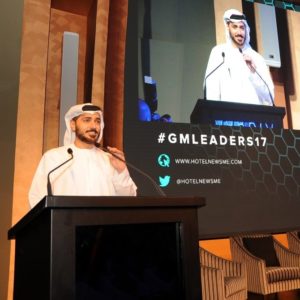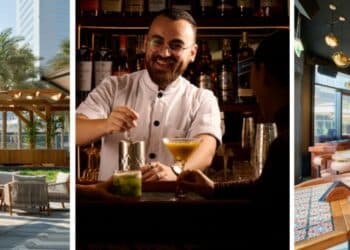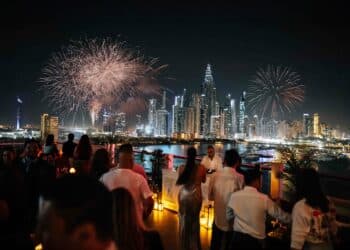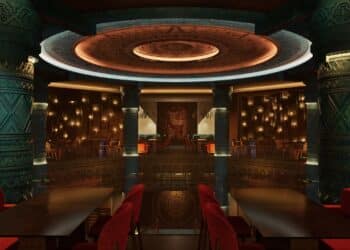Over 200 general managers and senior hotel professionals attended Hotel News Middle East’s GM Leaders Conference at The W Dubai Al Habtoor City on 3 May to discuss and debate the key trends, topics and challenges facing the industry in 2017. Here we present the key highlights
Dubai is more than short-stop destination

This was the message from Dubai Department of Tourism and Commerce Marketing (DTCM) CEO Issam Kazim during his keynote presentation.
“A lot of people are aware of the landmark projects in Dubai but over the years people have not realised there is a depth to Dubai’s offering as well,” he said.
“We are emphasising the cultural and heritage side of Dubai. We have to make people realise that Dubai is well beyond a two- or three-day destination. We know that a lot of people come to Dubai for the first time because they are sent by their company for an exhibition and they don’t know what to expect.”
He said the key is to make sure business travellers come back again and extend their stays for the next business visit or with their family and friends. Kazim said that if visitors have enjoyable stays, full of different activities, it will lead to much more positive word of mouth.
He highlighted the restaurants, souks and abras as examples of the experiences that Dubai offers. The challenge, Kazim said, is to position Dubai to different markets with different needs.
Expo 2020 is a means to an end to making Dubai the number one global family destination, he added.
“We were number seven in 2013 when we first started to monitor our progress. We jumped to number five the year after and then have stayed at number four after that,” he said.
Dubai welcomed 14.9 million tourists last year, with Paris’ figure of just over 18 million, the next target for the emirate.
Middle East hotels need to ‘act fast’ over water scarcity
A new report from PwC Middle East shows that climate change and resource scarcity will have a significant impact on the region’s hospitality industry.
Dr. Martin Berlin, deals partner at PwC Middle East presented the report, ‘Global megatrends… and their impact on the Middle East’s travel and tourism industry’.
He commented: “Climate change and resource scarcity is very important. If you look at the population growth we are expecting, we will require 50% more energy, 40% more water and 45% more food compared to current levels.
“It’s important to look at these factors and address them proactively before it’s too late. For example, in the GCC, 80% of the water is coming out of de-salination, which is very energy consuming and over a long period, is not sustainable. How we deal with water in the hospitality industry is going to play an important role going forward – we need to start managing this now.”
Dr. Berlin suggested that instead of allowing guests unlimited access to water, this should be restricted.
“We need to educate and raise awareness, for example we’re already regulating the water in the shower a certain amount but instead of the customer volunteering, it would be about forcing the customer to save the environment.”
In addition to climate change and water scarcity, the report highlighted four other major shifts in the industry, including demographic and social change, a shift in global economic powers, rapid urbanisation and technological breakthroughs.
Only way to beat OTAs is to ‘think smart’
Hotels are going to have think outside of the box if they are going to win the battle against online travel agents, according to the CEO of the Emaar Hospitality Group.
Olivier Harnisch made his comments during a panel discussion.
“We are not going to beat the OTAs with money and resources as that would be a hopeless, hopeless endeavour,” he said.
“Just to put things into perspective, the biggest hotelier, Marriott has an annual online budget of $100 million, Priceline has ‘40 times as much and 20 times as many rooms’ in terms of resources. We can’t beat them.”
The only way hotels can compete, according to Harnisch is to instil an attitude among guests, that direct booking through a hotel’s website is better.
He said the question remains, are the incentives there for guests to make direct bookings rather than using OTAs?
Booking needs to be more user friendly on a hotel’s website, an area where, Harnisch says OTAs currently have an advantage.
Richard Collins, general manager of Habtoor Grand Beach Resort and Spa, Autograph Collection Hotels said there is a clear necessity in the market for OTAs but they have created problems as well.
“There is a lack of creativity with OTAs. Sometimes revenue is having a look at Booking.com or Expedia and seeing that your next door neighbour has dropped by AED10, so therefore you must drop by AED10 too,” he said.
“It’s a wonderful opportunity to get first-hand customers into your company but one of the negatives is that it spreads a lack of creativity among hotel revenue directors.”
David Allan, cluster general manager, Radisson Blu Hotels Dubai Waterfront and Dubai Canal Views, said that many hotels still hadn’t caught up with the OTAs and “are still trying to push rates that aren’t necessarily of value to customers”.
Rabih Feghali, director, business development, Roya International added: “We need to ask, ‘what is in it for owners?’
“Once you take out all the costs of a booking, including 20% to the OTAs, the owner is left with a slither of what they are entitled to,” he said.
Hotels in danger of ‘analysis paralysis’
Hoteliers are in danger of relying too heavily on technology to provide a personalised service, according to panellists who explored how hotel operators can best utilise the huge volumes of guest information they collect through applications and social media.
David Simon, hotel manager, The Palace Downtown said that the flexibility guest data offers his team allows them to build a more personalised experience for the guest, but the key is training.
“I think technology today enables us to be much more flexible to cater to guest needs and this is a great advantage, but at the same time the human touch is very important so we need to make sure we have well trained staff to deal with the technology and the data generated by this.
“We should use the technology to train our staff, especially with Gen Z who are interested in this technology and find it natural to use it to provide a better guest experience.”
And while platforms such as TripAdvisor and Instagram allow hoteliers to listen better to guests, according to David Wilson, GM of Waldorf Astoria Palm Jumeirah, problems arise when it comes to the variety of applications available for hotels to collect data internally.
Stephen Meredith, general manager, Steigenberger Hotel Business Bay believes this can cause problems.
He commented: “There is a bewildering array of applications that generate a lot of information but the challenge is taking this and translating it back to service on the floor.
“A lot of the software applications we look at are very good standalone applications but often they don’t tick all the boxes that you need, so we’re forced to look into multiple applications with a lot of overlap between them and this causes an ‘analysis paralysis’.”
And while technology can be useful for creating a more personalised experience, ironically, it can also have the opposite effect. According to Meredith, hoteliers must be “wary”.
He said: “Before, as a hotelier you were on the floor, you didn’t have all this information and you would phone up the guest the old-fashioned way. I think the danger is we’re losing that, which isn’t a good thing. I think we have to be wary of technology.”
Also speaking on the ‘Adapting to Changing Guest Demands’ panel were Francis Desjardins, general manager, Fairmont Ajman; Patrick Antaki, complex general manager, Le Meridien Al Aqah Beach Resort, Fujairah and Al Maha, a Luxury Collection Desert Resort & Spa; and Guzman Muela, general manager, Time Oaks Hotel & Suites.
Middle East hotels outperforming the rest of the world
Hotels in the Middle East are performing better than those in all other regions of the world according to Philip Wooller, area director Middle East & Africa, STR.
In 2016, the Middle East had 66.2% average occupancy, an average room rate of $174.6 and RevPar of $115.6.
Wooller commented: “If we look at occupancies, I like to compare the US (61%), Europe (63%) and Asia-Pacific (68%), which have much, much lower average room rates.
“So, despite some of the challenging times we’ve seen in the region in the past two years, it is still performing at a much higher level than all the other regions.”
Wooller said that across the world, the industry is showing improving profitability in general and RevPar is “in positive territory,” but the Middle East is performing best in this area.
“RevPar for 2016 shows that the Middle East is performing at a much higher level. Asia-Pacific is operating at around $105, the US at $119 and the Middle East at $177,” he said.
Wooller added that January, February and March of 2017 have shown a positive pattern when it comes to the supply-demand gap for the region, suggesting the market is recovering.
“When we look at January, February and March, you can see some positive spikes and the data is suggesting things have improved in the past three months,” said Wooller.
“Supply is up 5.1% and that’s year-to-date and demand is up 7.3% – that’s a really important number. Demand is outstripping supply.”
Wooller closed his session with some interesting statistics about Dubai.
He commented: “Dubai in terms of area is 117th in the world, in terms of population 104th, it’s the fourth most visited city on the planet and in terms of international visitor spend, it is number one, which is AED113 billion, 31% of which is spent on accommodation.”
D-Day on horizon for VAT
Time is running out for hotels in the Middle East when it comes to being prepared for the introduction of VAT, said tax director, indirect tax for Deloitte Middle East, Bruce Hamilton.
Bruce Hamilton made his remarks during his expert session.
“All I’m saying to you at this moment in time is if you haven’t started the process yet, now is the time to do so,” he said.
“If anybody thinking of trying to lobby for change at this point – forget it – you are wasting your time. Clarification? Yes you can ask for it. Lobbying for change to the process? We don’t have time to introduce the processes that would lead to changes before 2018. It’s just not going to happen.”
What hotels need to show, he said, is that their reputation is unimpeachable.
“It needs to be assured that you are seen to be doing the right thing and putting in the effort,” he said.
“You can’t allow it to impact on how you are doing business currently, if you have other projects they may need to take a back seat, they may need to be deferred but VAT cannot be deferred.”
There needs to be a strategy to deal with VAT, he warned, before adding that “panic is not a solution”.


































































